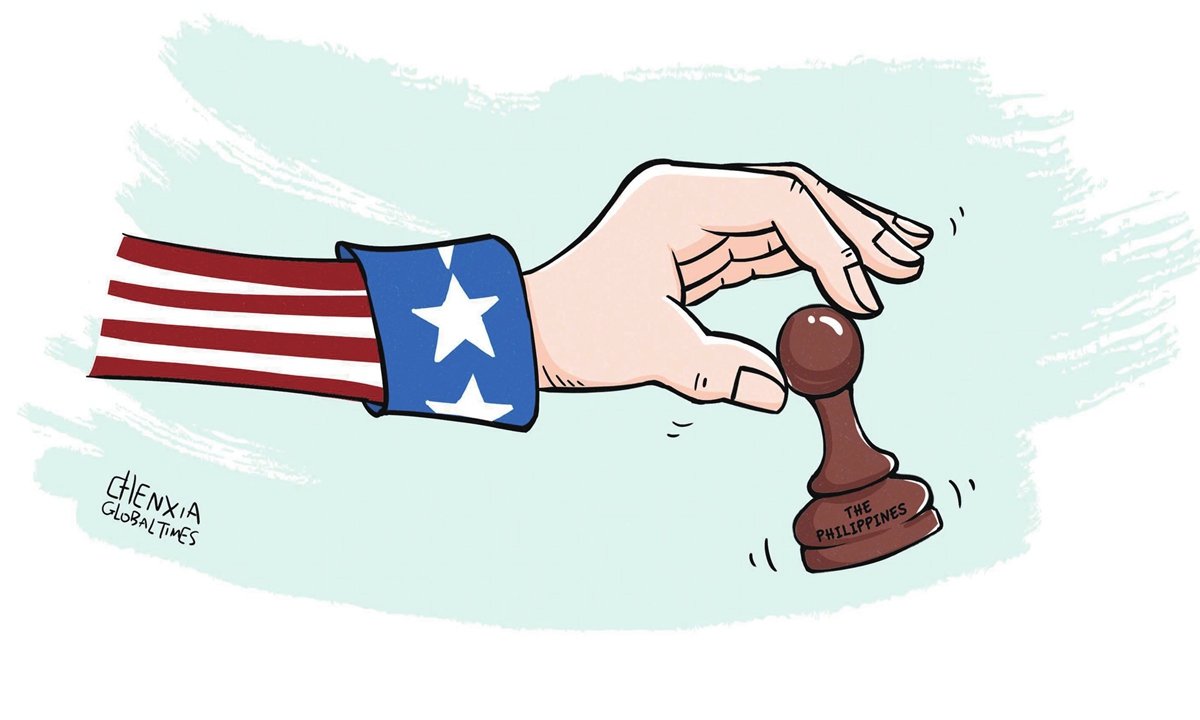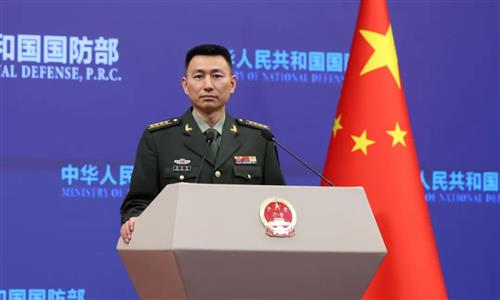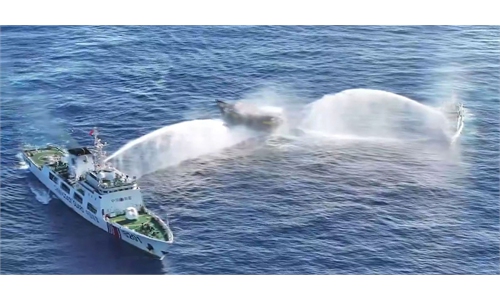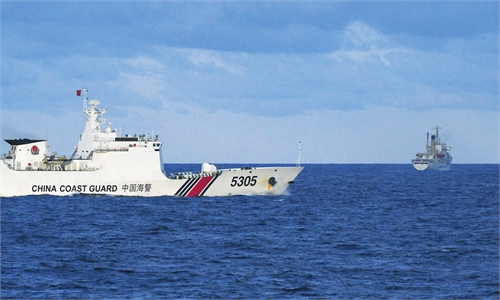
Illustration: Chen Xia/GT
Philippine President Ferdinand Marcos Jr. stated on Thursday that the Philippines will not be "cowed into silence, submission or subservience." This statement follows the recent actions of the Philippines, who on March 23 sent two Philippine Coast Guard vessels and one resupply vessel to intrude into the adjacent waters of Ren'ai Jiao of China's Nansha Qundao, in violation of its own words and in disregard of China's strong opposition. This was an attempt to transport construction materials to the illegally "grounded" warship for its reinforcement. In response, the China Coast Guard (CCG) has implemented lawful regulation, interception and expulsion in a reasonable and professional manner.Unsurprisingly, the Philippines distorted the truth and turned things around, with Commodore Jay Tarriela, spokesperson of the Philippine Coast Guard, smearing the actions of the CCG.
US State Department spokesman Matthew Miller later issued a statement claiming to stand with the Philippines. Ray Powell, who heads Project Myoushu (South China Sea) at the Stanford Gordian Knot Center for National Security Innovation, described the CCG's use of water cannons on a Philippines boat as "sheer brutality."
Does this maritime farce sound familiar? The Philippines' frequent replenishment missions to Ren'ai Jiao mainly aim at delivering construction materials for reinforcement of the illegally grounded military vessel. Manila wishes to turn the vessel into a permanent military outpost to achieve the permanent illegal occupation of Ren'ai Jiao.
On May 9, 1999, the Philippines sent BRP Sierra Madre, a military vessel, to intrude into China's Ren'ai Jiao and illegally ran it aground on the pretext of "technical difficulties." China immediately made solemn representations to the Philippines, demanding the immediate removal of the vessel. But the Philippines claimed that the vessel could not be towed away because of a "lack of parts." Although the Philippines has promised many times to tow away the vessel it has taken no action.
Former president Benigno Aquino III refused to acknowledge the fact and refused to tow the vessel away. Since 2023, despite China's opposition, the Philippines has been repeatedly replenishing the illegally grounded military vessel at Ren'ai Jiao, and hyping up incidents such as alleged laser irradiation and water cannon spraying to confuse right and wrong.
It is obvious that the real purpose of the Philippines' sadfishing is to cover up the fact that they are illegally supplying materials. The Philippines is not delivering necessary life supplies but rather smuggling large amounts of building materials. This action seriously infringes on China's territorial sovereignty, violates the UN Charter and the basic principles of international law, goes against the Declaration on the Conduct of Parties in the South China Sea, and also goes against promises made by the Philippines.
China has already pointed out a way out for the Philippines on the issue of Ren'ai Jiao. However, after coming to power, Marcos Jr. went back on his word and chose confrontation. During the Duterte government, China reached a gentleman's agreement with the Philippines, and the Philippines promised not to reinforce military vessels on the grounded warship and not to build facilities on Ren'ai Jiao, and to inform China of their plans in advance. China, in turn, allowed the Philippines to deliver necessary life supplies to the grounded warship. Interactions between China and the Philippines over the Ren'ai Jiao issue were properly managed, and the overall situation at sea remained calm. However, regrettably, since early 2023, the Marcos government has maliciously denied the existence of the gentleman's agreement and blatantly transported large construction materials to Ren'ai Jiao. This is the most direct cause of the recent escalation of contradictions surrounding the Ren'ai Jiao issue.
In January 2024, the Philippines took the initiative to propose a "new model" for handling the issue of resupplying Ren'ai Jiao to China, and China responded with goodwill. In early February, according to this "new model," China allowed the Philippines to resupply once again with life supplies. However, shortly after, the Philippines broke the internal understanding again and organized journalists to "expose" and create momentum, obstructing the legitimate law enforcement actions of Chinese coast guard ships. The Philippines attempted to portray itself as the victim, while also spreading rumors about China across the international community.
China has drawn a red line on the Ren'ai Jiao issue. If the Philippines insists on provoking again and again, China will inevitably retaliate and the Philippines will suffer the consequences. It is not that China is incapable of stopping the Philippines' illegal actions, but it has always maintained great restraint and patience with the Philippines. On March 24, Chinese Ministry of National Defense spokesperson Wu Qian demanded that the Philippines stop all infringing and provocative moves. He warned that if the Philippines repeatedly challenges China's bottom line, China will continue to take resolute measures to firmly safeguard its territorial sovereignty and maritime rights.
The US has played a behind-the-scenes role in the Ren'ai Jiao issue, and its Project Myoushu exposed the US' attempt to use the Philippines as a pawn to contain China. In recent years, the US has continued to sow discord between China and the Philippines. In February 2023, during his visit to the Philippines, US Defense Secretary Lloyd J. Austin reiterated that the US commitment to Philippine security is ironclad, and that the Mutual Defense Treaty extends to Philippine armed forces, public vessels or aircraft anywhere in the South China Sea.
When Marcos visited the US in May of the same year, the US announced that it would modernize and strengthen its alliance with the Philippines.
Recently, US Secretary of State Antony Blinken visited the Philippines and reiterated America's "ironclad" security commitments to the Philippines. American think tanks are not idle either, and are constantly providing advice to the Philippines. The one that has jumped the highest this year is Stanford University's Project Myoushu that touches on security issues in the South China Sea. The project leader and team are all retired US military officers, and funding allegedly comes from the US Navy. The name of the project "Myoushu" is a term from Go, the Chinese board game. Obviously, in the eyes of the US, the Philippines is a chess piece in the geostrategic game of containing China.
We advise the Philippines to think twice before acting, read more about world history and the history of its country being colonized by the US, otherwise it will see those "chess pieces" eventually become abandoned by the US.
The author is an expert on border and sea. opinion@globaltimes.com.cn



